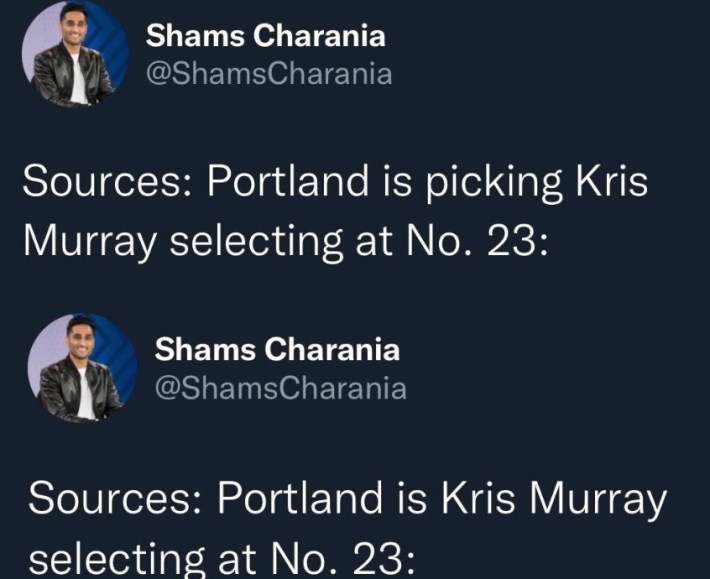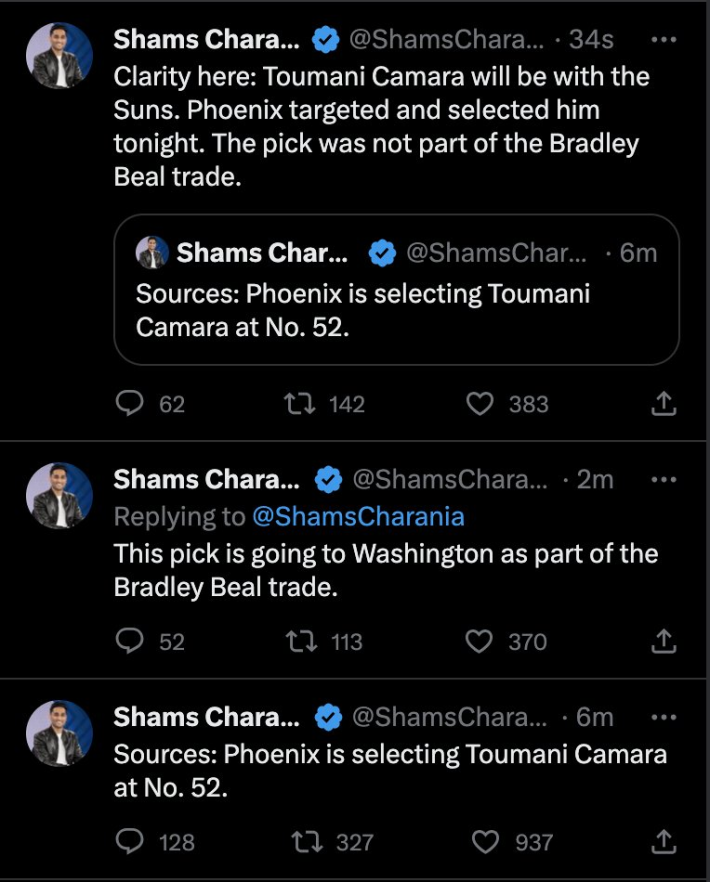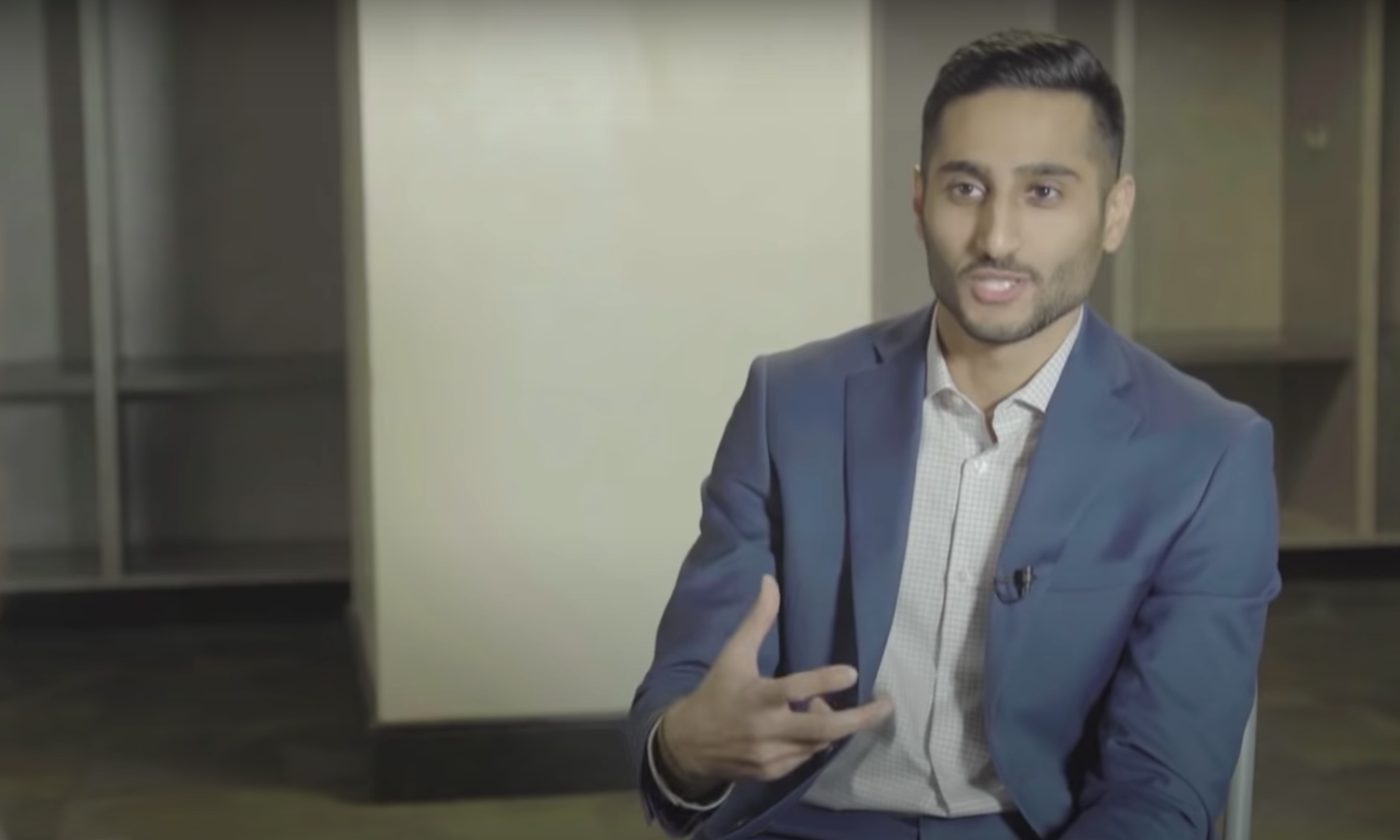Heading into the 2023 NBA Draft, Victor Wembanyama's name had been written at the top of the board in pen—blood? Beaujolais?—for years, though the guy who would be selected one pick later was a mystery down to the wire. Would outgoing Hornets owner Michael Jordan, in his last act in the role, further bury his down-bad fanbase and saddle them with Brandon Miller, or would he reach for the stars and go with Scoot Henderson, fit worries be damned? Boring question! Here's a better one: How can I make money off of this?
Running a gambling market on something like a draft, where, say, certain ESPN employees know certain outcomes in advance and can take you for $300,000 by leveraging the inside information they learn by doing their jobs seems like a dubious proposition all around. The only good reason there are betting markets around the NBA draft is inertia, since so many states have legalized sports gambling and people have shown they'll wager on all manner of outré offerings, like races for political office, results of various coin flips, and Washington Wizards games. As long as some book has sufficient information to offer odds, there is a guarantee that someone somewhere will bet on anything you put in front of them. Also, the draft is on TV, and the core marketing appeal of the unholy union between gambling concerns and sports leagues is Maybe you find this sport boring, but wouldn't it be more fun with some skin in the game?
Mock drafts aplenty spent June flip-flopping Miller and Henderson, and even after Miller flubbed his first workout and Henderson reportedly shot the lights out, every indication out of Charlotte was that they'd been leaning Miller for months. The odds reflected this, but language artist Shams Charania upended expectations and scrambled the betting market when he tweeted the following on Thursday morning:
Sources: Scoot Henderson is gaining serious momentum at No. 2 with the Charlotte Hornets in tonight’s NBA draft. Hornets have been torn over the last week between Henderson and Brandon Miller. Team has final meetings today to settle on decision.
— Shams Charania (@ShamsCharania) June 22, 2023
Naturally, the Hornets selected Miller, to the horror of their fans and their mascot. Oops!
The reaction at Pinhouse when the Hornets picked Miller pic.twitter.com/pauFZAsSXO
— The Crown Club 👑 (@CrownClubCLT) June 23, 2023
Charania duffed this one, the way he's duffed dozens of other scoops, though what is interesting here is less the missed layup itself but rather the second-order effects. After Charania's tweet, the odds flipped dramatically, with Scoot's odds swapping in one book from a +175 to a -700, which makes sense given Charania's general reliability. In fact, the same thing would have happened if Charania's principal rival, Adrian Wojnarowski, had expressed similar confidence, and we know this because it happened last year, at the very top of the draft.
On the morning of the 2022 draft, Woj reported that the Magic would likely pick Jabari Smith first overall, only for Orlando to shock everyone and select Paolo Banchero. In that case, the betting markets also moved around dramatically. It makes some sense that both Woj and Shams were wrong in these instances: The explicit strategy of teams ahead of the draft is to lie to the public and to each other—Jeff Weltman essentially said as much after picking Banchero last year—and a fun part of digesting mountains of draft coverage is learning within the span of a few hours who got played and who was tricking everyone. In smokescreen season, anyone can be a mark, which is part of what made the pointed wording of this Woj dunk/tweet so funny.
All along, the entire Charlotte Hornets organization has been all-in on Brandon Miller -- ownership, front office, scouts, coaches. They see him as a perennial future All-Star player.
— Adrian Wojnarowski (@wojespn) June 23, 2023
The problem with Shams Charania being a mark is that Shams Charania works for a betting company. He has a job with The Athletic and he also hosts a show for FanDuel, which offered odds on the second pick in the draft. Woj's employer ESPN is in bed with FanDuel's blood enemy (DraftKings), but the link is not nearly as direct as it is in Charania's case. He is not a neutral party in this, as he is paid directly by a company that makes its money from fans who, in this case, placed bets partially based on information Charania puts out into the world.
This is not to say that Charania faceplanted deliberately, to personally profit or to make his bosses a bunch of money, or even that someone who knew the pick would be Miller leaked him bad info and took advantage. He doesn't have to have screwed up on purpose for it to be an issue. Charania already told you who he was when he started working for FanDuel, which is itself an obtuse extension of the access-based laundering that propels his news-breaking output. Today's lucrative whoopsie is not him screwing up at his job, but him doing his job. Taking him seriously as a guy who can provide you neutral information—let alone in a straightforward way that does not make your head throb in confusion—is a fool's errand, one that just so happens to make his bosses rich when the access-based nuggets he doles out turn out to be turds.
Anyway, other than that kerfuffle, his night went great.








